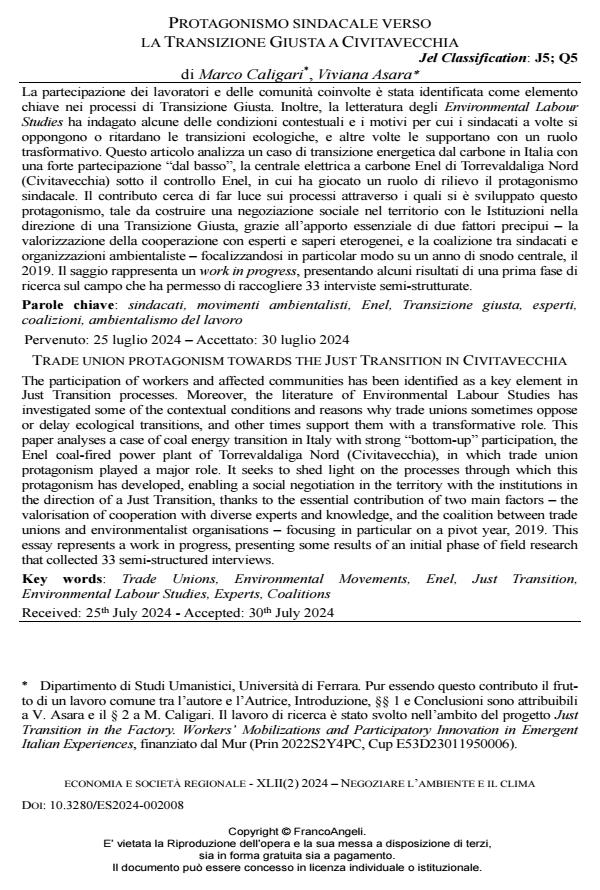Protagonismo sindacale verso la transizione giusta a Civitavecchia
Titolo Rivista ECONOMIA E SOCIETÀ REGIONALE
Autori/Curatori Marco Caligari, Viviana Asara
Anno di pubblicazione 2024 Fascicolo 2024/2
Lingua Italiano Numero pagine 16 P. 103-118 Dimensione file 309 KB
DOI 10.3280/ES2024-002008
Il DOI è il codice a barre della proprietà intellettuale: per saperne di più
clicca qui
Qui sotto puoi vedere in anteprima la prima pagina di questo articolo.
Se questo articolo ti interessa, lo puoi acquistare (e scaricare in formato pdf) seguendo le facili indicazioni per acquistare il download credit. Acquista Download Credits per scaricare questo Articolo in formato PDF

FrancoAngeli è membro della Publishers International Linking Association, Inc (PILA), associazione indipendente e non profit per facilitare (attraverso i servizi tecnologici implementati da CrossRef.org) l’accesso degli studiosi ai contenuti digitali nelle pubblicazioni professionali e scientifiche.
La partecipazione dei lavoratori e delle comunità coinvolte è stata identificata come elemento chiave nei processi di Transizione Giusta. Inoltre, la letteratura degli Environmental Labour Studies ha indagato alcune delle condizioni contestuali e i motivi per cui i sindacati a volte si oppongono o ritardano le transizioni ecologiche, e altre volte le supportano con un ruolo trasformativo. Questo articolo analizza un caso di transizione energetica dal carbone in Italia con una forte partecipazione “dal basso”, la centrale elettrica a carbone Enel di Torrevaldaliga Nord (Civitavecchia) sotto il controllo Enel, in cui ha giocato un ruolo di rilievo il protagonismo sindacale. Il contributo cerca di far luce sui processi attraverso i quali si è sviluppato questo protagonismo, tale da costruire una negoziazione sociale nel territorio con le Istituzioni nella direzione di una Transizione Giusta, grazie all’apporto essenziale di due fattori precipui - la valorizzazione della cooperazione con esperti e saperi eterogenei, e la coalizione tra sindacati e organizzazioni ambientaliste - focalizzandosi in particolar modo su un anno di snodo centrale, il 2019. Il saggio rappresenta un work in progress, presentando alcuni risultati di una prima fase di ricerca sul campo che ha permesso di raccogliere 33 interviste semi-strutturate.
Parole chiave:sindacati, movimenti ambientalisti, Enel, Transizione giusta, esperti, coalizioni, ambientalismo del lavoro
Jel codes:J5; Q5
Marco Caligari, Viviana Asara, Protagonismo sindacale verso la transizione giusta a Civitavecchia in "ECONOMIA E SOCIETÀ REGIONALE " 2/2024, pp 103-118, DOI: 10.3280/ES2024-002008